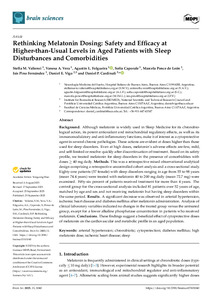Por favor, use este identificador para citar o enlazar este ítem:
https://repositorio.uca.edu.ar/handle/123456789/20651| Título: | Rethinking Melatonin Dosing: Safety and Efficacy at Higher-than-Usual Levels in Aged Patients with Sleep Disturbances and Comorbidities | Autor: | Valiensi, Stella M. Vera, Vanesa A. Folgueira, Agustín L. Caporale, Sofía Ponce de León, Marcela Pino Fernández, Isis Vigo, Daniel E. Cardinali, Daniel P. |
Palabras clave: | HIPERTENSION ARTERIAL; CARDIOPATIAS; MELATONINA; SUEÑO; DIABETES | Fecha de publicación: | 2025 | Editorial: | MDPI | Resumen: | Background. Although melatonin is widely used in Sleep Medicine for its chronobiological action, its potent antioxidant and mitochondrial regulatory effects, as well as its immunomodulatory and anti-inflammatory functions, make it of interest as a cytoprotective agent in several chronic pathologies. These actions are evident at doses higher than those used for sleep disorders. Even at high doses, melatonin’s adverse effects are few, mild, and self-limited or resolve quickly after discontinuation of treatment. Based on its safety profile, we treated melatonin for sleep disorders in the presence of comorbidities with doses ≥ 40 mg daily. Methods. This was a retrospective mixed observational analytical design comprising a retrospective uncontrolled cohort analysis and a cross-sectional study. Eighty-one patients (57 female) with sleep disorders ranging in age from 55 to 98 years (mean 74.4 years) were treated with melatonin 40 to 200 mg daily (mean 72.7 mg) were examined. Fifty-six percent of patients received treatment for more than 4 years. The control group for the cross-sectional analysis included 81 patients over 52 years of age, matched by age and sex and not receiving melatonin but having sleep disorders within the same period. Results. A significant decrease was observed in arterial hypertension, ischemic heart disease and diabetes mellitus after melatonin administration. Analysis of clinical laboratory variables indicated no changes in the treated group versus the untreated group, except for a lower alkaline phosphatase concentration in patients who received melatonin. Conclusions. These findings suggest a beneficial effect of cytoprotective doses of melatonin on the cardiovascular and metabolic profile in an aged population. | URI: | https://repositorio.uca.edu.ar/handle/123456789/20651 | ISSN: | 2076-3425 | DOI: | 10.3390/ brainsci15101040 | Derechos: | Atribución-NoComercial-CompartirIgual 4.0 Internacional | Fuente: | Brain Sci. 15(1040), 2025 |
| Aparece en las colecciones: | Artículos |
Ficheros en este ítem:
| Fichero | Descripción | Tamaño | Formato | |
|---|---|---|---|---|
| rethinking-melatonin-dosing.pdf | 564,85 kB | Adobe PDF |  Visualizar/Abrir |
Este ítem está sujeto a una Licencia Creative Commons

